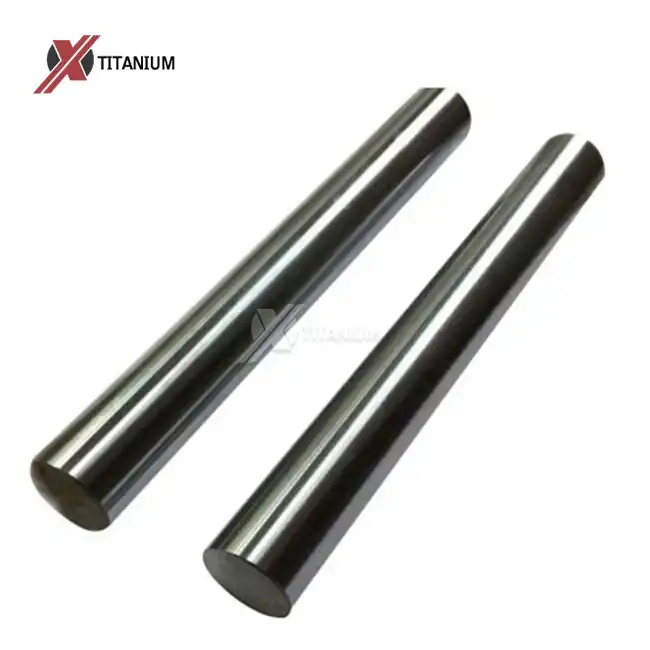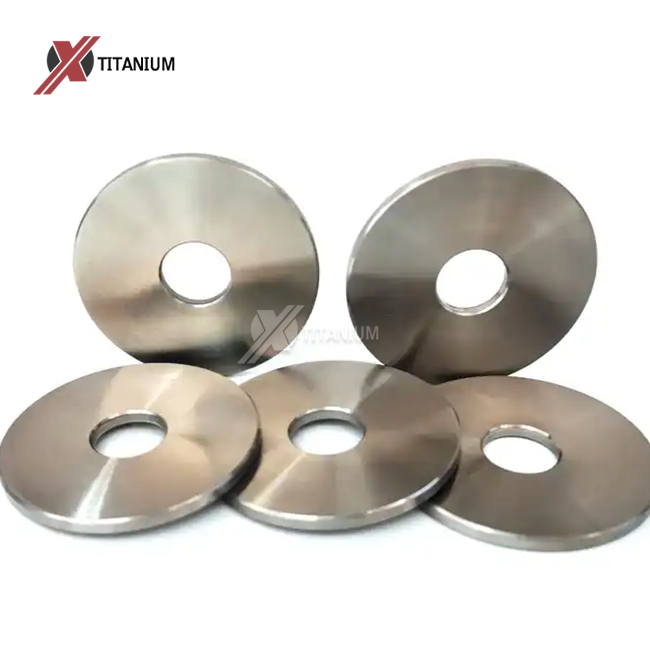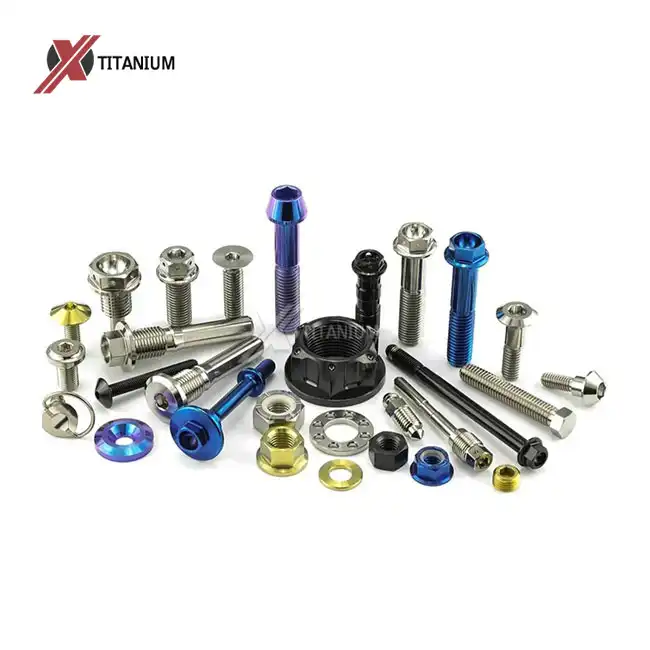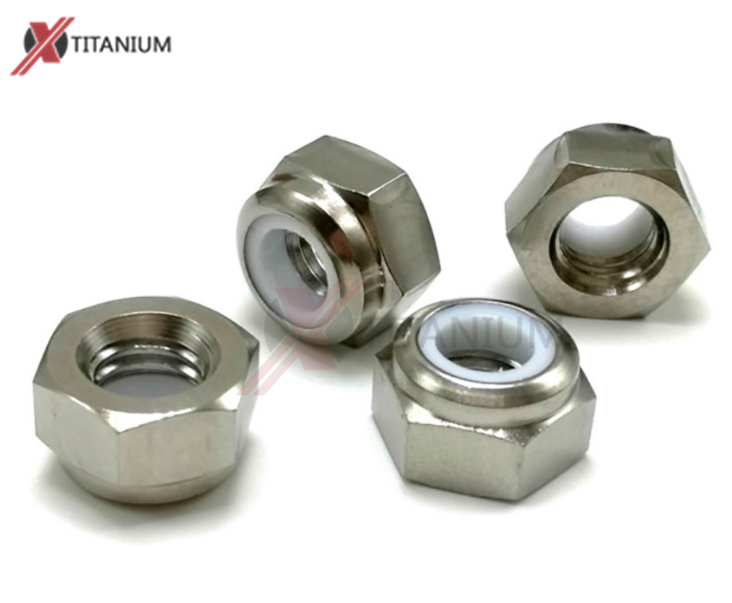The Unique Properties of Titanium Wing Nuts in Marine Applications
Corrosion Resistance: A Marine Necessity
In the relentless battle against corrosion in marine environments, titanium wing nuts emerge as formidable allies. The exceptional corrosion resistance of titanium stems from its ability to form a protective oxide layer spontaneously when exposed to air or water. This self-healing property ensures that even if the surface is scratched or damaged, a new protective layer quickly forms, maintaining the integrity of the fastener.
Unlike conventional steel or even stainless steel fasteners, titanium wing nuts remain unscathed by saltwater exposure. This resistance to chloride-induced corrosion is particularly valuable in marine settings, where the constant presence of salt can rapidly degrade less resilient materials. The corrosion resistance of titanium extends beyond just saltwater; it also withstands other corrosive substances often encountered in marine environments, such as various chemicals used in marine operations.
Strength-to-Weight Ratio: Lightweight Yet Robust
The impressive strength-to-weight ratio of titanium wing nuts offers significant advantages in marine applications. Titanium boasts a strength comparable to steel but at nearly half the weight. This characteristic is crucial in marine engineering, where every gram counts. By using titanium wing nuts, engineers can achieve substantial weight reductions without compromising on structural integrity.
In high-performance marine vessels, such as racing yachts or military craft, the use of titanium wing nuts contributes to overall weight reduction, potentially enhancing speed and fuel efficiency. Moreover, the reduced weight of titanium fasteners can ease the strain on surrounding structures, potentially extending the lifespan of the entire assembly.
Durability and Longevity in Harsh Conditions
The marine environment is notoriously unforgiving, subjecting materials to a combination of stressors including UV radiation, temperature fluctuations, and mechanical stress from waves and vibrations. Titanium wing nuts excel in these conditions due to their inherent durability. The metal's high fatigue strength means it can withstand repeated stress cycles without failure, a crucial attribute in the constantly moving marine environment.
Furthermore, titanium's resistance to temperature extremes ensures that titanium wing nuts maintain their structural integrity and performance across a wide range of temperatures. This stability is particularly valuable in marine applications that may experience significant temperature variations, from icy arctic waters to tropical climates.
Practical Applications of Titanium Wing Nuts in Marine Settings
Shipbuilding and Boat Manufacturing
In the realm of shipbuilding and boat manufacturing, titanium wing nuts find numerous applications. They are particularly valuable in areas of vessels that are exposed to seawater or experience high stress. For instance, titanium wing nuts are often used in deck fittings, hatch covers, and equipment mounts. Their corrosion resistance ensures that these critical components remain secure and easy to operate even after prolonged exposure to marine conditions.
High-performance sailing vessels, such as racing yachts, benefit significantly from the use of titanium wing nuts. In these applications, the combination of light weight and high strength contributes to improved speed and maneuverability. Additionally, the ease of manual operation of wing nuts allows for quick adjustments and equipment changes, which can be crucial in competitive sailing scenarios.
Offshore Structures and Equipment
Offshore structures, such as oil rigs and wind farms, operate in some of the most challenging marine environments. Here, titanium wing nuts prove their worth in various applications. They are often used in equipment mounts, access panels, and maintenance hatches. The corrosion resistance of titanium ensures that these fasteners remain operable and intact, even when subjected to constant exposure to seawater spray and atmospheric salt.
In offshore wind turbines, where weight reduction at height is crucial, titanium wing nuts offer an excellent solution for various assembly and maintenance requirements. Their light weight contributes to the overall efficiency of the structure, while their durability ensures long-term reliability in these remote and hard-to-access installations.
Marine Research and Exploration Equipment
The field of marine research and exploration often requires specialized equipment that can withstand extreme underwater conditions. Titanium wing nuts play a vital role in the assembly and maintenance of underwater cameras, sensors, and sampling equipment. Their corrosion resistance is particularly valuable in deep-sea applications, where equipment may be submerged for extended periods.
Remotely Operated Vehicles (ROVs) and autonomous underwater vehicles also benefit from the use of titanium wing nuts. These fasteners provide secure attachments for various components while contributing to the overall weight reduction of the vehicle. This is crucial for improving the maneuverability and operational range of these underwater exploration tools.
Considerations and Best Practices for Using Titanium Wing Nuts in Marine Environments
Proper Installation and Maintenance
While titanium wing nuts offer superior performance in marine environments, proper installation and maintenance are crucial to maximize their benefits. When installing titanium wing nuts, it's important to avoid over-tightening, as this can lead to galling – a form of adhesive wear that can occur between metal surfaces under high pressure. Using appropriate lubricants designed for use with titanium can help prevent this issue.
Regular inspection of titanium wing nuts, even though they are highly corrosion-resistant, is still recommended. This helps ensure that they remain properly tightened and allows for early detection of any potential issues. In most cases, maintenance of titanium wing nuts in marine environments is minimal, often requiring nothing more than occasional cleaning to remove salt deposits or marine growth.
Galvanic Corrosion Considerations
While titanium itself is highly resistant to corrosion, it's important to consider the potential for galvanic corrosion when using titanium wing nuts in conjunction with other metals. Titanium is more noble than many other metals commonly used in marine applications, such as aluminum or steel. This means that in a galvanic couple, the less noble metal will corrode preferentially.
To mitigate this risk, it's advisable to use appropriate insulating materials or coatings when titanium wing nuts are in contact with dissimilar metals. In some cases, sacrificial anodes may be employed to protect the less noble metals in the assembly. Careful consideration of the entire assembly's material composition is crucial to ensure long-term integrity in marine environments.
Cost-Benefit Analysis in Marine Applications
While titanium wing nuts offer superior performance in marine environments, they typically come at a higher initial cost compared to alternatives like stainless steel. However, a thorough cost-benefit analysis often reveals that the long-term advantages of titanium can outweigh the initial investment.
The extended lifespan of titanium wing nuts in marine environments means fewer replacements are needed over time. This can result in significant savings in maintenance costs and downtime. Additionally, the weight savings offered by titanium can translate into improved fuel efficiency in marine vessels, providing ongoing operational cost benefits.
When considering titanium wing nuts for marine applications, it's important to evaluate the specific requirements of the project. In critical applications where failure is not an option, or in high-performance scenarios where weight savings are crucial, the benefits of titanium often justify the higher upfront cost.
Conclusion
Titanium wing nuts stand out as an excellent choice for marine environments, offering a unique combination of corrosion resistance, strength, and lightweight properties. Their ability to withstand the harsh conditions of saltwater exposure while providing reliable performance makes them invaluable in various marine applications, from shipbuilding to offshore structures and underwater exploration equipment.
While considerations such as proper installation, galvanic corrosion prevention, and cost analysis are important, the long-term benefits of using titanium wing nuts in marine settings are clear. As marine technology continues to advance, the role of these specialized fasteners is likely to grow, contributing to more durable, efficient, and high-performance marine systems.
For those seeking high-quality titanium wing nuts and other titanium products for marine applications, Baoji Chuanglian New Metal Material Co., Ltd. offers expert solutions. With over a decade of experience in titanium product manufacturing and research, they provide a wide range of titanium fasteners and components suitable for various marine needs. For more information or to discuss your specific requirements, please contact them at info@cltifastener.com or djy6580@aliyun.com.




